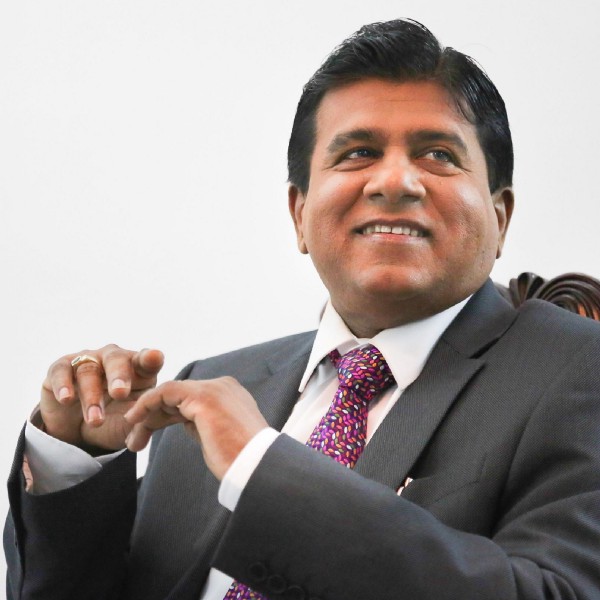The recent Hambantota port deal struck between Sri Lanka and China has raised eyebrows in the neighbourhood. While India has expressed concerns over the island nation’s decision, the agreement has found detractors within the government in Colombo as well. In this interview, former minister Wijeyadasa Rajapakshe, who was sacked recently for criticising the deal, refuses to mince his words and lashes out against the government for mortgaging the future of the next generation with this deal.
On August 23, President Maithripala Sirisena sacked his Justice and Buddha Sasana Minister Wijeyadasa Rajapakshe for violating the collective responsibility of the Cabinet. An MP from the ruling United National Party (UNP), Rajapakshe (no relative of ousted President Mahinda Rajapakse) was sacked when he refused to resign for expressing dissent publically on the decision of the government to grant a 99-year lease of the Hambantota port, overlooking the Indian Ocean, to a Chinese company.
A lawyer by profession with a reputation for integrity, Rajapakshe, according to many political commentators, is a man to watch out for as he leverages his opposition to the China deal to weave together a future alliance of Buddhists and Sinhala nationalists.

Wijeyadasa Rajapakshe
Hardnews met Rajapakshe on a rainy morning at his heavily guarded residence in Colombo, a few days after his exit from the government. He was bitter about the circumstances of his removal. His criticism of the Hambantota port deal, though, is well argued. The former minister fears that Sri Lanka will become a Chinese colony if the government doesn’t end the 99-year lease granted. According to him, it was corruption that drove this deal and not national interest. Rajapakshe was also categorical that the Sri Lanka government should do nothing to hurt its relationship with India. Excerpts from the interview:
The main reason for sacking me from the Cabinet was that I opposed, for various reasons, the long-term lease to China of the Hambantota port. First, there is no necessity to give it to China as Hambantota is our harbour and we built it. Though we have some loans to pay, there is no reason to violate the cardinal policy of the government according to which harbours should not be given to outsiders. It is crucial for the country’s security and also that of the entire region. It is not a commercial transaction as the contract has gone to China Port, which is a government-owned firm. China has an agenda, especially due to its animosity towards India. And this project could disrupt peace in the entire region.
The Sri Lankan government was told not to go ahead with the deal by India, the US, the European Union and Japan. They realise that this could aggravate tensions between the two Asian countries and further cause turbulence in international politics.
However, our government did not pay attention to this important reality as its decision was driven by purely political reasons. It has forgotten that in their minds, the people of Sri Lanka have a deep-rooted relationship with India. This has been built after many generations and nothing should be done to disrupt it. What the government has also forgotten are the sacrifices of our ancestors and how they fought to secure this land from Europeans. It means that the land is sacred and it is more important than dollars and rupees. We will be mortgaging the future of the next generation with this decision. How will they evict them in the future? There is no need to give it to foreign powers, as the money that they are bringing will not be enough to set off this loan.
Besides, we have enough capital in Sri Lanka. If the project had been offered to the Sri Lankan private sector, it would have raised funds and executed the project. Why was the port given on lease for 99 years and not 25 years? My sense is that the deal smells of big corruption.
At the moment, Colombo port handles 86% of trans-shipment. If Hambantota lives up to its potential and provides all the facilities, then why should any ship go to Colombo port? I think that only one port can survive.
The Hambantota port agreement with a Chinese company does not serve Sri Lanka’s national interest as it prevents us from developing Galle and other ports along the southern coast. This agreement is ruinous for us. It also violates Article 157 of the Constitution that prevents the government from entering a contract with a foreign party until Parliament has passed it with a two-thirds majority. Also, the Sri Lanka Port Authority, which is a signatory to the agreement, has no right to lease out a harbour to a foreign power. It is ultra vires of the Constitution.
We should also remember Djibouti. The Chinese went there to set up a commercial port and now they have built a military base there. Quite clearly, they have an ulterior motive.
Our government lacks this important understanding that Sri Lanka’s relationship with India is more important than anything else. If you bypass this important principle, then both the countries will suffer.
I also do not agree with the view that this land was given on lease to the Chinese to pay off our debt. Our total national debt is $78 billion. If this is the route they will take to clear our debt then what else will they sell? The truth is that it is a corrupt transaction. They are trying to turn Sri Lanka into a Chinese colony!
For raising these issues, I was sacked from the government in the name of “Cabinet’s collective responsibility.” This is bizarre as dissent in the Cabinet has been endured from the very early days of our government.
ChinaColomboHambantotaIndiaSouth AsiaSri LankaWijeyadasa Rajapakshe